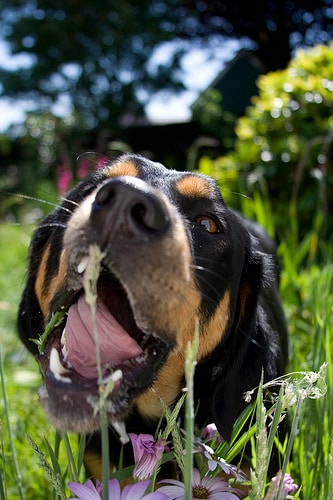 Dogs
love to munch away on grass, and some even make it part of their daily
routine. Fortunately, most experts believe it isn't something you should
worry about. So why exactly do they gobble up that green stuff in your
yard?
Dogs
love to munch away on grass, and some even make it part of their daily
routine. Fortunately, most experts believe it isn't something you should
worry about. So why exactly do they gobble up that green stuff in your
yard?Scavengers 'R Us
Dogs, unlike their catty counterparts,
are not carnivores. But they're not like your garden-variety omnivores,
either. For tens of thousands of years, these opportunistic scavengers
have devoured anything and everything, as long as it fulfilled their
basic dietary requirements.
The modern dog, partly because of
evolution and domestication, is no longer like its ancestors, which
frequently ate their prey entirely, including the stomach contents of
plant-eating animals. Instead, dogs today seek out plants as an
alternative food source. Most commonly the plant is grass -- since that
is what is closest at hand -- but wild canines are known to eat fruits,
berries, and other vegetable matter, too.
Clearly, dogs can find their nutrients in
a wide range of plant foods, but that doesn't explain why Fido usually
throws up after eating grass.
When the Tummy's Grumblin'
A dog will seek out a natural remedy for a gassy
or upset stomach, and grass, it seems, may do the trick. When ingested,
the grass blade tickles the throat and stomach lining; this sensation,
in turn, may cause the dog to vomit, especially if the grass is gulped down rather than chewed.
Although dogs don't typically graze on
large amounts of grass like a cow, they may nibble on grass, chew on it
for a while, and not throw up (an unwell dog will tend to gulp the grass
down in big bites and then throw up). This may be because they find the
texture of the grass palatable, or just because they need to add a
little roughage to their diet.
Nutritional Necessity
Whatever the reason may be, most experts
see no danger in letting your dog eat grass. In fact, grass contains
essential nutrients that a dog might crave, especially if they're on a
commercial diet. If you notice that your dog has been munching away on
grass or houseplants, then you may want to introduce natural herbs
or cooked vegetables into their diet. Dogs aren't finicky like cats,
but they're not too fond of raw veggies either. They're kind of like big
furry kids that way.
So, when you think about it, grass
munching isn’t that bad at all. However, watch out for a sudden increase
in grass eating; it could be a sign of a more serious underlying
illness that your dog is trying to self treat, and that requires
immediate veterinary assistance.
You may also want to buy a small tray of grass just for the dog, or start an herbal home garden.
This will give your poor pooch an alternative to the outdoor grass and
landscaping, the eating of which could lead to accidental ingestion of
pesticides, herbicides, or chemicals that have been used to treat your
(or your neighbor's) yard.
*cited from PetMD.com





















